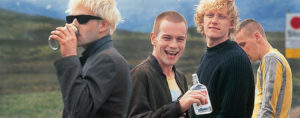I was illiterate until my mid-thirties. I’m 57 now and my first book has just been published. It’s tradition for your publisher to deliver the first few copies from the printer’s press to the author. A local courier, James, delivered a box of 10 last week. It was a joyous moment, to see something stared at on a screen for over four years turned into an object that could be held, flicked through, something I could smell. However, that joy was short lived as James, the 54-year-old courier, was killed for the contents of his van one mile or so down the road two days later. His violent end didn’t even make the local news. Durham police posted on Facebook that two men had been charged with manslaughter and theft. Murders and all forms of crime have become common around here now. It’s the norm.
This didn’t happen when I was growing up. One of those men would probably have been welding in a shipyard and the other passing his father through the cage doors at the pithead of the village colliery as they changed shifts.
The ex-coalfield communities of Durham are ghost towns today, their once vibrant high streets boarded up and dead. I don’t believe there is a shop or business in my village or the surrounding towns and villages that has not been burgled at least three or four times. I have a letting office in the high street that was hit three times last year. The factory unit I run my building business from has its doors pulled off at least once a year: the last time, only two weeks ago. My brother owns the last pub standing and has a list of 46 crimes committed on his premises — from serious assault to car crime — none of which have ended in prosecution. Why? Because there was no investigation. Even the undertaker’s shop has had its doors kicked off in the middle of the night, for the sake of a Help the Heroes charity box. He had buried a veteran that day. The thieves took his hearse and ram-raided the local café and made off with the till before parking the hearse in the North Sea. The dentist’s surgery, smashed up, the only remaining butcher cleaned out of meat in the dead of the night, a sandwich shop robbed and burned out, the hairdresser’s shop ransacked, the hardware shop constantly hit despite its owner taking most of his stock home every night in his van.
The last time my shop was robbed, I rang the police. I was put on hold for over one hour before being told, if I wanted an attendance, I would have to apply by email and at the present time it was taking them about three or four weeks to get an officer out. My friend and neighbour had his house burgled just before Christmas. The criminals took his children’s Christmas presents he’d hidden in his wardrobe, put them in his wife’s car and drove off. A few weeks later his wife spotted her car while doing the school run and followed it to the house of a known criminal. She rang the police and was informed after a three day wait that the case was now closed. My friend made an official complaint, which resulted in the police eventually visiting the address weeks later, only to report that the known criminal had proved it was his car despite my friend still having the original documents for the vehicle in his possession. Case closed.
Few around here contact the police anymore. That stopped years ago. Looking at my village and the surrounding towns and villages today reminds me of the film Shaun of the Dead. The untidy queues of dehumanised zombies shuffling into the steel-shuttered shopfronts of the only thriving businesses left, the chemists, have the place I grew up in looking more like a Forties death camp than modern day Britain. This new “underclass” go there twice a day, some three, to take their supervised dose of the taxpayer-funded legal high, methadone; a heroin substitute.
The ex-mining villages and towns of East Durham have the highest rate of people on sickness benefit in the UK, the highest rate of people on invalidity benefit and by far the highest rate of people who have been on invalidity for the longest period of time. The people around here have the lowest percentage of car ownership in Britain. The highest rate of unemployment. The lowest home ownership and believe it, if you can, over the last decade, while life expectancy for men around here has not gone up or down, for women it has dropped. This is the only place in Britain where the life expectancy for women is dropping. Another friend of mine is an undertaker in Hartlepool and told me that he now has just as many clients under 35 than elderly. My brother’s daughter was one. She was kicked to death for a drug debt of £50. She was 32, witty and highly intelligent.
I’ve heard many so-called experts over the years say it is difficult to link the social depravation and high levels of crime directly to Thatcher’s deliberate policies of deindustrialisation. All I can conclude from this is that there is no such thing as an expert.
A little over 100 years ago there was nothing here; just fields. Once coal was discovered, the villages were built immediately. My forefather’s bred for cutting coal. Then came Thatcher.
I left school in 1982, just as Thatcher was riding high on a popularity wave after single-handedly taking back the Falkland Islands despite never pulling on a pair of boots or leaving London. I was not taught anything at my comprehensive school that might have prevented me from going down the pit, on the contrary, I was only ever given the skills required for when I inevitably found myself at the bottom of that 1,500-foot shaft. As coal could not be cut by pen, it had been decided I and many around me should remain illiterate. I clearly remember a whole bunch of us going to our village colliery to sign up for a miner’s life. We were told to fill in application forms. The few writers helped the many non-writers and we were asked to return in exactly one month. We did but the gates were chained. The mine closed. The dole queue I joined the back of was four and a half million souls long.
The ship building industry was put to death soon after. British steel fell. British rail disappeared, British Gas gone, British telecom, still there, but belonging to someone else. The national Grid, chopped up and sold for a song. Even the very waterways, pipes, and drainage systems laid by our forefathers, snatched away. British aerospace with its airports, sold off. And last-but-not-least, our Royal Mail, snapped up for a fraction of its worth by wealth investors. Ours one day, gone the next.
Thatcher had been busy slipping through new legislation while the wider British public were glued to images of burned-out ships from her South Atlantic war. The miners could no longer be supported by any other group of workers. “Coming out in sympathy,” was banned by legislation so radical that even some Tories had the decency to abstain. The new laws ran rough-shod over hundreds of years of hard-earned worker’s rights.
I don’t believe any beast, person or group of people has ever survived having their heart ripped out and my community and surrounding communities are no exception.
It was like a political bomb went off on that day as we gathered, shocked and bewildered, at our pit’s locked gates, killing some, blasting some of us to the four corners of the world whilst leaving some poor souls blackened, lame and smouldering in the ashes. As for me, I left, travelling the world in search of a better life. “Deserting a sinking ship,” you might say. However, after coming back, years later, literate and witnessing not just a lack of progression but a shocking regression, I wrote a book that hopefully might create, at least some awareness, of what the poor souls here suffered, and the survivors are still suffering today.
We have seen a string of inert careerist politicians come and go since Maggie, each one as inept and bland as the last. The working people here have nowhere to aim their vote, their will unrepresented. It seems the trapdoor under the old likeminded and relatable working-class politician has snapped opened, leaving not only an empty stage but a gapping vacuum where no one new would dare stand. The majority here, who on-the-whole still consider themselves of the Left, feel neglected. They admire straightforwardness, bravery even, yet their beloved Labour party was and still is a coward.
So, as for now, the tsunami of poverty, deprivation, alcoholism, divorce, depression, and addiction to illegal and prescription drugs is still gathering momentum. “Bad life syndrome,” the local health workers are chastised for calling it here. Thousands of lives, lacking aim, opportunity, or fulfilment, treated with pills and powders.
Recently, NHS nurses have been striking over pay, but it doesn’t appear to me that they have any real public support. It seems the tortoise head of pan-bashers who made their trendy din of appreciation during the pandemic have retracted into the safe shell of their homes; their silence, deafening. The rail workers, the teachers, the university staff, doctors, ambulance drivers, healthcare workers, airport workers, civil servants, the post office workers and more have all been involved in industrial action this year — separately. Despite them all belonging to one much larger group. The working classes.
It is hard to believe one person in the top job could change the personality of a nation. From a once caring and united community-driven society to the fractured and divided, “I’m alright Jack, ‘loads ov money,” dog-eat-dog existence we are enduring today, but it happened. And it happened in my lifetime.
There is a new breed of politician today, claiming that British industries were put to death on grounds of the environment. This is completely untrue.
The way worker’s rights along with British industries were irradicated and the conscious effort it took to achieve this should never be forgotten. For a so-called developed nation to have treated and still treat its subjects with such contempt was, and still is, a disgrace and deserves no forgiveness. Margaret Hilda Thatcher died in the luxury of the Ritz Hotel, London, of a stroke in 2013. On the day she died and on the day of her funeral, nobody I know worked. We put up flags and bunting, flocked to our few surviving pubs, drank lots and danced into the night. You probably have difficulty understanding this depth of hatred and that I can understand. But if you had walked under my skies on the same pothole-laden paths as I, then believe me, you too would have drunk beer and danced with me long into those nights. And just to be clear, we did not celebrate because we were naïve enough to imagine that because of her death, things might now get better. It was spite.
Disclaimer
Some of the posts we share are controversial and we do not necessarily agree with them in the whole extend. Sometimes we agree with the content or part of it but we do not agree with the narration or language. Nevertheless we find them somehow interesting, valuable and/or informative or we share them, because we strongly believe in freedom of speech, free press and journalism. We strongly encourage you to have a critical approach to all the content, do your own research and analysis to build your own opinion.
We would be glad to have your feedback.
Source: UnHerd Read the original article here: https://unherd.com/





